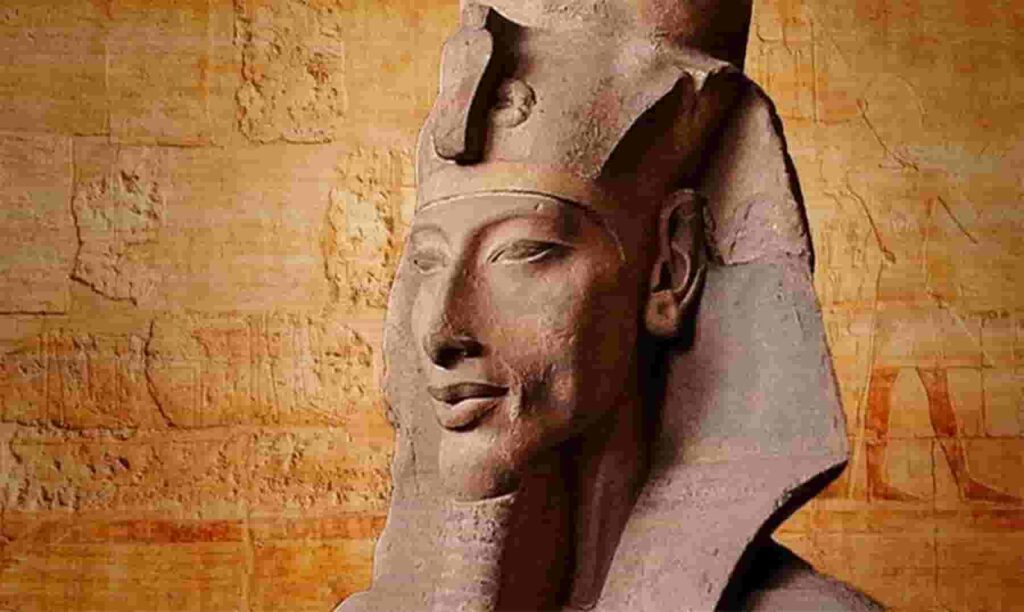In the vast panorama of Egyptian history, few figures stand out as prominently as Akhenaten, the pharaoh whose religious and cultural revolution left an indelible mark on ancient Egypt.

Akhenaten not only moved the kingdom’s capital to Amarna but also introduced a unique form of monotheism, challenging the millennia-old traditions of Egyptian polytheism. His actions echoed through the centuries, raising questions about his true motivations and the lasting impact of his reign.
The Life and Reign of Akhenaten
The Great Experiment in the Desert
Akhenaten, initially known as Amenhotep IV, made a bold decision to transfer Egypt’s capital from Thebes to a new city in the desert, Akhetaten (modern-day Amarna). This move represented not only a geographical shift but also a symbolic break from the religious and cultural traditions of Thebes. As Nicholas Reeves describes in Akhenaten: Egypt’s False Prophet, “The decision to build Akhetaten was as much a political gesture as it was a spiritual one.”
The new capital was intended to be the epicenter of the sun god Aten’s worship, replacing the traditional pantheon of Egyptian gods. This “great experiment in the desert” had profound repercussions throughout the kingdom, affecting everything from administration to the daily lives of Egyptians.
The Death of Akhenaten and the Mystery of Amarna
After about 17 years of reign, Akhenaten passed away, and with his death, Amarna quickly fell into disuse. The city was abandoned, and efforts to erase his legacy began. The location of his tomb remained a mystery until the early 20th century when Tomb 55 was discovered in the Valley of the Kings. The identity of the mummy found in this tomb sparked controversy, leading to debates among Egyptologists about whether it belonged to Akhenaten or another member of the royal family.
The Controversy of Tomb 55
The Discovery and Identification of the Mummy
Tomb 55 was discovered by archaeologist Theodore Davis in 1907. Inside, Davis found a mummy in an advanced state of deterioration, along with several artifacts suggesting a connection to Akhenaten. However, the identification of the mummy was complicated by its condition and the lack of clear inscriptions.
Marfan Syndrome: An Explanation for the Deformities
A widely discussed theory is that Akhenaten may have suffered from Marfan syndrome, a genetic condition that causes elongated limbs and other physical deformities. This hypothesis, proposed by several specialists, could explain the artistic depictions of the pharaoh with unusual physical characteristics such as an elongated face, wide hips, and slender limbs. As Donald B. Redford explains in Akhenaten: The Heretic King, “Marfan syndrome offers a plausible explanation for Akhenaten’s peculiar physical features.”
Akhenaten’s Religious Legacy
Akhenaten’s Monotheistic Vision
Akhenaten is often cited as one of the earliest advocates of monotheism in recorded history. He proclaimed Aten, the sun disk, as the only true god, a vision that starkly contrasted with Egypt’s traditional polytheism. This radical change is compared by some scholars to the monotheism of Moses, suggesting possible cultural and religious influences. According to James Henry Breasted in A History of Egypt, “Akhenaten was a spiritual pioneer, anticipating ideas that would later become central to Judaism and Christianity.”
The End of Amarna and the Return to Thebes
After Akhenaten’s death, his successor Tutankhamun (originally Tutankhaten) restored the old religious order and moved the capital back to Thebes. The temples of Aten were abandoned, and the city of Amarna was dismantled. Systematic efforts were made to erase Akhenaten from history, a process known as damnatio memoriae. However, despite these attempts, Akhenaten’s impact could not be entirely eradicated.
Akhenaten: The First Idealist in History?
Akhenaten’s Courage and Individuality
Akhenaten is remembered not only for his religious reforms but also for his courage and individuality. He challenged the status quo and pursued his vision, regardless of the consequences. In The Dawn of Conscience, James Henry Breasted describes Akhenaten as “the first idealist in history,” someone who sought to impose a new spiritual order based on his personal convictions.
Akhenaten, with his religious and cultural revolution, remains one of the most enigmatic and fascinating figures in ancient history. His attempt to establish monotheism and his unique artistic vision have intrigued historians and Egyptologists for centuries. Though his vision was suppressed and his memory almost erased, Akhenaten’s legacy endures as a testament to humanity’s capacity to challenge and transform the world around them. Akhenaten reminds us of the importance of questioning traditions and following our convictions, even in the face of adversity.